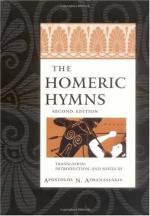Thus tenacious of life has been the myth of Mother and Maiden, a natural flower of the human heart, found, unborrowed, by the Spaniards in the maize-fields of Peru. Clearly the myth is a thing composed of many elements, glad and sad as the waving fields of yellow grain, or as the Chthonian darkness under earth where the seed awaits new life in the new year. The creed is practical as the folk-lore of sympathetic magic, which half expects to bring good harvest luck by various mummeries; and the creed is mystical as the hidden things and words unknown which assured Pindar and Sophocles of secure felicity in this and in the future life.
The creed is beautiful as the exquisite profile of the corn-tressed head of Persephone on Syracusan coins: and it is grotesque as the custom which bade the pilgrims to Eleusis bathe in the sea, each with the pig which he was about to sacrifice. The highest religious hopes, the meanest magical mummeries are blended in this religion. That one element is earlier than the other we cannot say with much certainty. The ritual aspect, as concerned with the happy future of the soul, does not appear in Iliad or Odyssey, where the Mysteries are not named. But the silence of Homer is never a safe argument in favour of his ignorance, any more than the absence of allusion to tobacco in Shakspeare is a proof that tobacco was, in his age, unknown.
We shall find that a barbaric people, the Pawnees, hold a mystery precisely parallel to the Demeter legend: a Mystery necessarily unborrowed from Greece. The Greeks, therefore, may have evolved the legend long before Homer’s day, and he may have known the story which he does not find occasion to tell. As to what was said, shown, and done in the Eleusinia, we only gather that there was a kind of Mystery Play on the sacred legend; that there were fastings, vigils, sacrifices, secret objects displayed, sacred words uttered; and that thence such men as Pindar and Sophocles received the impression that for them, in this and the future life, all was well, was well for those of pure hearts and hands. The “purity” may partly have been ritual, but was certainly understood, also, as relating to excellence of life. Than such a faith (for faith it is) religion has nothing better to give. But the extreme diligence of scholars and archaeologists can tell us nothing more definite. The impressions on the souls of the initiated may have been caused merely by that dim or splendid religious light of the vigils, and by association with sacred things usually kept in solemn sanctuaries. Again, mere buffoonery (as is common in savage Mysteries) brought the pilgrims back to common life when they crossed the bridge on their return to Athens; just as the buffooneries of Baubo brought a smile to the sad lips of Demeter. Beyond this all is conjecture, and the secret may have been so well kept just because, in fact, there was no secret to keep. {59}




